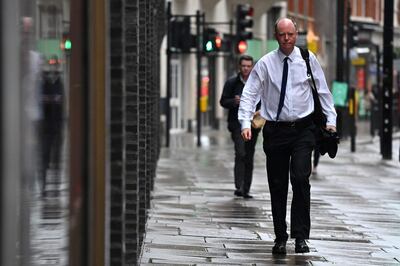Prime Minister Boris Johnson said Britain was facing significant challenges, but said the lockdown introduced in England on Thursday could be lifted in early December.
He said the tough restrictions would hopefully mean that families could come together at Christmas.
"The advice I've received suggests that four weeks is enough for these measures to make a real impact so these rules will expire. There is light at the end of the tunnel," he said.
NHS England chief executive Simon Stevens said hospital care would be disrupted if the virus was left unchecked.
He said there were more than 11,000 people with Covid-19 in hospital beds in England compared with about 500 at the start of September.
"Today's infections are tomorrow's order book for intensive care," he said.
It came as England's chief medical officer said coronavirus will never disappear and could return every year in the same way as seasonal flu.
Prof Chris Whitty said people could still catch coronavirus even after a vaccine was introduced.
His remarks came as England entered a second national lockdown on Thursday – a shutdown one minister blamed on people who flouted social distancing rules in the summer.
Prof Whitty told the British Medical Journal that coronavirus could remain a problem for health authorities for years to come.
“I don’t think that the virus is going to disappear. We’ll get medical countermeasures – drugs, vaccines, or other things – and they’ll help us de-risk it significantly,” he said.
“But I think we’ll have Covid circulating, and it may become like seasonal flu.”
Prof Whitty said eradication of the disease was not a realistic goal.
“I’m not equating HIV and Covid as diseases, they’re very different," he said.
"But they are two infectious diseases that have had a massive impact on society, where medical science and medical practice will reduce the risk such that the impact on society will be much smaller - without being able to say that it’ll be completely gone.
“Because I don’t think ‘completely gone’ is a realistic goal for this or most other infections.”
Prof Whitty repeated his belief that a vaccine may be available next year but said the public should not bank on it.
"I think there’s a reasonably good chance that we will get a vaccine in the next year,” he said.
“But nobody should assume that, and nobody should put a date on it.”
Meanwhile, UK Justice Secretary Robert Buckland said infected people who refused to quarantine were partly to blame for England’s second shutdown.
Mr Buckland said it would be a “huge challenge” to get people to follow the rules during the four-week lockdown.
“That’s one of the reasons we are having to take the measures we are today," he told the BBC.
“Sadly, it’s been difficult frankly regarding the compliance of some people with regard to the quarantine restrictions.
“I think it would be very ambitious of me to suggest that somehow we will be able to use the enforcement authorities to intervene in every case as I think sadly that’s not possible.”
Police said that people who broke the rules were now less likely to get off with a warning.
“Not following the regulations and measures put in place to limit the spread of the virus is unacceptable," National Police Chiefs’ Council chairman Martin Hewitt said.
"We won’t waste time with endless encouragement for those who knowingly or deliberately break the rules. People recklessly ignoring the regulations should expect to receive a fixed penalty notice.”
















